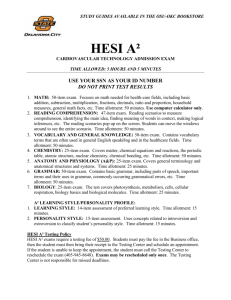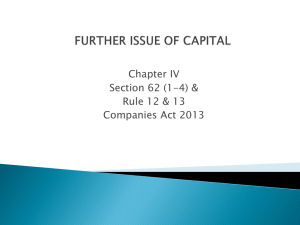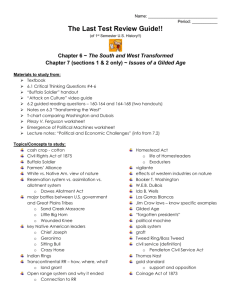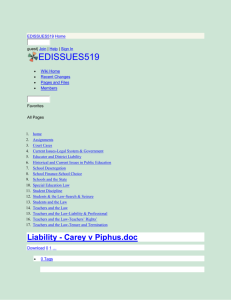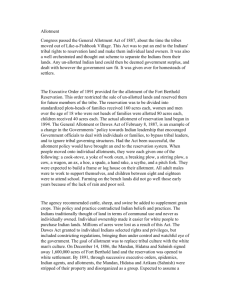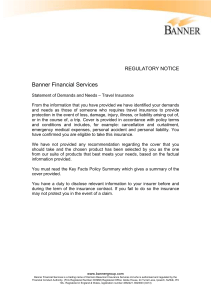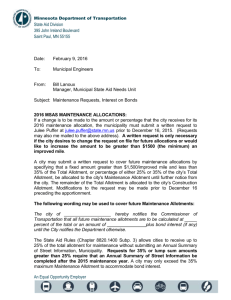paper - Barnet Allotment Federation
advertisement
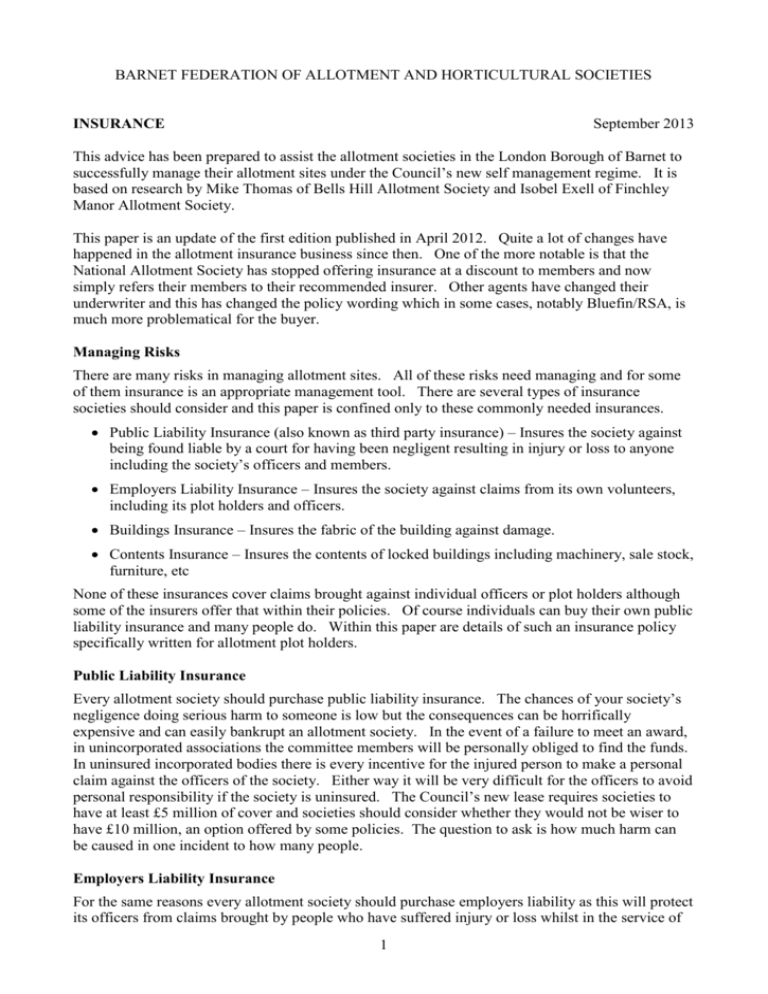
BARNET FEDERATION OF ALLOTMENT AND HORTICULTURAL SOCIETIES INSURANCE September 2013 This advice has been prepared to assist the allotment societies in the London Borough of Barnet to successfully manage their allotment sites under the Council’s new self management regime. It is based on research by Mike Thomas of Bells Hill Allotment Society and Isobel Exell of Finchley Manor Allotment Society. This paper is an update of the first edition published in April 2012. Quite a lot of changes have happened in the allotment insurance business since then. One of the more notable is that the National Allotment Society has stopped offering insurance at a discount to members and now simply refers their members to their recommended insurer. Other agents have changed their underwriter and this has changed the policy wording which in some cases, notably Bluefin/RSA, is much more problematical for the buyer. Managing Risks There are many risks in managing allotment sites. All of these risks need managing and for some of them insurance is an appropriate management tool. There are several types of insurance societies should consider and this paper is confined only to these commonly needed insurances. Public Liability Insurance (also known as third party insurance) – Insures the society against being found liable by a court for having been negligent resulting in injury or loss to anyone including the society’s officers and members. Employers Liability Insurance – Insures the society against claims from its own volunteers, including its plot holders and officers. Buildings Insurance – Insures the fabric of the building against damage. Contents Insurance – Insures the contents of locked buildings including machinery, sale stock, furniture, etc None of these insurances cover claims brought against individual officers or plot holders although some of the insurers offer that within their policies. Of course individuals can buy their own public liability insurance and many people do. Within this paper are details of such an insurance policy specifically written for allotment plot holders. Public Liability Insurance Every allotment society should purchase public liability insurance. The chances of your society’s negligence doing serious harm to someone is low but the consequences can be horrifically expensive and can easily bankrupt an allotment society. In the event of a failure to meet an award, in unincorporated associations the committee members will be personally obliged to find the funds. In uninsured incorporated bodies there is every incentive for the injured person to make a personal claim against the officers of the society. Either way it will be very difficult for the officers to avoid personal responsibility if the society is uninsured. The Council’s new lease requires societies to have at least £5 million of cover and societies should consider whether they would not be wiser to have £10 million, an option offered by some policies. The question to ask is how much harm can be caused in one incident to how many people. Employers Liability Insurance For the same reasons every allotment society should purchase employers liability as this will protect its officers from claims brought by people who have suffered injury or loss whilst in the service of 1 the society, whether they are employees or volunteers. The statutory minimum cover for employers liability insurance is £10 million. Buildings Insurance Most allotment societies own one or more buildings but not all societies would be wise to buy buildings insurance. If your buildings are wooden sheds whose cost to replace might be £1,000 and your society has £10,000 in the bank then choosing to self insure (take the risk yourselves) is a serious option. On the other hand, if your society has a fine brick building which would cost £20,000 to replace then you would probably be wise to insure it no matter how much you had in the bank. The new lease from the Council requires societies to insure Council-owned buildings but not “wooden tool sheds or buildings of a like temporary or insubstantial nature which are deemed uninsurable for reasons of not being economical to insure”. But the lease also requires societies to make up any difference between the cost of reinstating a damaged building and the compensation from any insurance policy. Thus the option of not replacing damaged or destroyed building is not open to societies in the case of Council-owned buildings. Contents Insurance Likewise with contents insurance, you should consider the likely realistic cost of replacing the contents. If you have furniture in a meeting room you might realistically expect your members to donate replacement furniture if it were stolen or destroyed by fire. If you hold sales stock it might be better to hold a lower value of stock rather than an expensive insurance policy. Machinery is the usual target of thieves but you may find that the excess in the policy (the bit you have to pay towards a claim) is so high it is hardly worth buying the policy. Allotment Insurers There are presently five sources from which you can buy insurance policies specifically for allotment societies. The Allotments and Gardens Council UK (A&GC) in partnership with Russell Scanlan and underwritten by Hiscox Shield/Vantage underwritten by Groupama (recommended by the National Allotment Society) Royal Horticultural Society underwritten by NFU Mutual Bluefin underwritten by Royal Sun Alliance Tennyson Insurance underwritten by Zurich Municipal (targets the voluntary sector rather than allotment societies specifically) In addition there is one source of insurance specifically for allotment holders. South West Counties Allotment Association (SWCAA) underwritten by European Risk Assurance Company The SWCAA policy for allotment holders is not an alternative to the other five policies and may be considered as a possible extra purchase to insuring the society. But some of the other policies include elements of member insurance. The five sources for allotment societies all differ in what they offer and what they charge for it. What will be the best buy for a particular society will depend on that society’s profile and what it wants to buy. For these reasons it will be worth every society working its way through the options. There is money to be saved! The next two pages compare the policies available and a commentary follows them. 2 Comparison of Policies Abbreviations: A&GC UK Allotments & Gardens Council UK RHS Royal Horticultural Society RSA Royal Sun Alliance Agent A&GC / Russell Scanlan Insurer Hiscox offers a range NAS SWCAA NFU National Allotments Society South West Counties Allotment Association National Farmers’ Union Cover Public & Product Liability £5m + Contents up to £15k, Machinery up to £5k, trophies up to £3k, money up to £2k Premium £63.60 Agent Bluefin £169.50 (excess applies) See note in the commentary + Buildings up to £50k, Solar panels up to £1k £265.00 (excess applies) Employer’s Liability add £79.50 Trustees Indemnity for £53.00 £50k add Trustees Indemnity for £106.00 £100k add Contact: Joy Dominic - 0115 947 0032 - joydominic@russellscanlan.org http://rsib.co.uk/insurance-broking/specialist-insurance/allotmentinsurance/ Tenant membership of A&GC UK required - £1 per member http://www.theallotmentsandgardenscounciluk.org.uk/ Insurer RSA (offer of 5 options) Beware of policy conditions especially clause 8 Cover 1. Public & Product Liability £5m 2. + Employer’s Liability £10m Premium £68.90 3. + General contents £15k, fire, theft & perils, unspecified machinery £5k all risks, trophies £3k all risks, money £2k, accidental damage, personal accident £5k 4. + Buildings up to £50k fire, theft & perils, accidental damage, solar panels 5. + Trustees Assurance £50k £265.00 £159.00 £371.00 £424.00 Contact: Melissa O’Connor - 01604 258915 melissa.oconnor@bluefingroup.co.uk - http://www.bluefingroup.co.uk/ £5 Bluefin fee applicable 3 Shield/Vantage Groupama Recommended by NAS Based on member nos. Public Liability £5m 20 members Public Liability £5m 50 members Public Liability £5m 70 members Employer’s Liability £5m add Landlord cover £5m add £61.93 RHS £90.23 £119.35 Second policy £37.10 £42.40 Trophies £2k add £23.21 Buildings £10k add £40.23 Machinery £7.5k add £39.75 Contact: Tayla Ellis - 01277 202 700 – tayla.ellis@vantageinsurance.co.uk http://www.vantageinsurance.co.uk/ Investigate Shield online for 7.5% discount Tennyson Insurance Zurich Municipal Insight Policy NFU (2 policies) Public Liability £5m + Employer’s Liability £10m Public Liability £10m + Employer’s Liability £10m Sheds, equipment, cups and trophies to value of £5k Sheds, equipment, cups and trophies to value of £10k Sheds, equipment, cups and trophies to value of £20k £70.00 £86.00 £65.00 £95.00 £125.00 Contact: Connie Page – 020 7821 3069 – communities@rhs.org.uk www.rhs.org.uk/Gardening/Community-gardening/RHS-affiliated-societies Membership of RHS required - £33 per society Public Liability £5m covers members, volunteers and trustees From £75 to £185 (depends on income) Events From £0 to £150 (depends on how many) Employer’s Liability £10m From £0 (depends on wageroll) to £75 All Risks Contents from From £0 £0 to £20k (£100 excess) to £100 Contact: Ben Galley - 01234 832115 - ben.gallley@tennysoninsurance.co.uk http://tennysoninsurance.co.uk/ Quotes available by phone/email or online. Better prices offered online for standard cover. Tailored cover not available online. Buildings quotes by phone. Prices exclude 6% tax. SWCAA (Individual Plot Holder Insurance) European Risk Assurance Company Public Liability £5m Society membership also available – membership fee reduced to £3 per member £5.00 per member (excess applies) Employer’s Liability £5m (Covers Committee Member + 6 volunteers) £10.00 Contact: Ayesha Sharman - 0127 327087 - swcaa@btconnect.com http://www.allotmentssouthwest.org.uk/ 4 Commentary It is obvious that insurance prices for allotment societies vary considerably. It is also obvious that there is no single best buy for all allotment societies. For example the costs of the Shield/Vantage policy are the same whether it is bought direct or via the NAS website link, but NAS charge a membership fee of £2 for each society member. Likewise the RHS require your society to affiliate to them before you can buy insurance. So, in making decisions you will need to take into account the other benefits, not shown in this paper, of being a society member of NAS or RHS. The first thing to do is to provisionally decide what risks you want to insure against. Apart from the four obvious risks described in this paper (public, employers, buildings and contents) there are many other risks which societies may wish to consider. These are often part of an insurer’s package or optional extras to a minimal package of risks. For example, some policies allow you to buy cover against product liability (for things you sell), trustee liability, members’ liability, bad weather spoiling events, loss of cash, legal costs, pollution incidents, fences, fallen trees, the cost of changing locks and many other things. You would only need to consider product liability insurance if you were manufacturing products for sale, rather than merely selling other people’s products. Trustee liability is not essential but might help the more nervous committee members to sleep easily. You need consider bad weather insurance if you run weather dependent events which are financially vital to your society. Legal costs insurance is a great comfort when you have plot holders or neighbours threatening legal action. With the possible exception of riparian (river bank) societies, it is most unlikely that an allotment society could cause a serious pollution incident. Fences, trees and locks are probably not worth insuring for any society and expenditure on these items should be planned. The First Lesson So the first lesson to learn from all this is that each allotment society has different needs and each insurer offers different advantages and prices. For example, some insurers have a fixed year and the price is the same even if you insure only for a part year. Other insurers will sell a year’s insurance from any date. Thus every society should shop around to find the best buy for itself. The Second Lesson And the second lesson to learn is that it’s worth doing the research, not only to buy cheaper, but to educate yourself so that you can make better decisions. Reading and considering insurers’ policies takes time – the RHS information pack and their NFU policies are hefty documents and, although written in plain English, can be pretty intimidating. And always remember, some risks will always be for small sums and these you can consider self insuring. Bluefin / RSA At the end of 2012 Bluefin changed its underwriter to RSA. The policy wording is now quite different and contains a significant problem for allotment societies in clause 8 of the policy criteria on the proposal form. 8. Neither you or any members of the association committee have ever: a) Been declared bankrupt or insolvent either as private individuals or in connection with any business. b) Been the subject of a county court judgement in respect of debt either as private individuals or in connection with any business. c) Been officers of a company that has been declared insolvent, or had a receiver or liquidator appointed, or entered into arrangements with creditors in accordance with the Insolvency Act 1986 or any subsequent legislation. d) Been disqualified under the Company Directors Disqualification Act 1986 or any subsequent legislation. 5 e) Been convicted of or charged with but not yet tried for a criminal offence other than a motoring offence. f) Had an insurance contract cancelled or declared void or a claim repudiated or renewal refused due to breach of a policy condition or due to non-disclosure or mis-description or misrepresentation of a material fact. g) Had insurance cover restricted or cancelled or renewal refused due to non-compliance with risk. On the face of it this wording might exclude many of your members from serving on the committee because their presence would invalidate your insurance. It might also mean that any committee member who once became insolvent many years ago or was once convicted of a minor offence, but doesn’t know of your insurance conditions and doesn’t think to mention his past, invalidates your insurance by sitting on your committee. If a committee member is burgled at home and has a claim repudiated because he didn’t have the right sort of door locks, he might not think to mention it or even know that this invalidates your society’s insurance whilst he remains a committee member. Should your society need to make a very large insurance claim for serious personal injury your insurer will have every incentive to start investigations to repudiate your claim. Allotment societies should think very carefully about whether they can manage the conditions associated with this policy. To overcome this problem an allotment society should ask existing and every new committee members to declare any issues coming within the clause. These should be declared in writing to the insurer who will probably accept that they are not material to the insurance. Some of the other insurers will have similar though less onerous clauses requiring declaration of past history. RHS / NFU RHS will insure their wooden society huts, contrary to what their policy states, and confirmed this in writing to the Finchley Horticultural Society. Other insurers may also be flexible if asked. SWCAA The SWCAA insurance is not an alternative to insuring your society and some of its advantages, particularly the insurance of members against claims, can be bought through some of the society policies. They do however offer Employer’s Liability cover for society membership for £10 plus £3 per plot holder. SWCAA claim not to be selling insurance within the meaning of the law but providing it as part of membership benefits and are unwilling to supply a copy of the policy. And Finally The pie chart shows how many of the 37 Barnet allotment societies are using which insurer in 2013. Andrew Brown, BFAHS Support Officer 6
